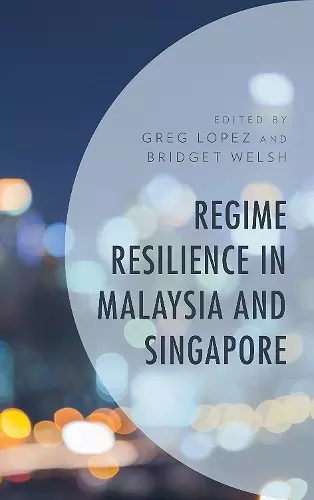Regime Resilience in Malaysia and Singapore
Greg Lopez editor Bridget Welsh editor
Format:Hardback
Publisher:Lexington Books
Published:15th Sep '18
Currently unavailable, and unfortunately no date known when it will be back

Prominent scholars across the political divide and academic disciplines analyze how the dominant political parties in Malaysia and Singapore, United Malays National Organisation (UMNO) and the People’s Action Party (PAP), have stayed in power. With a focus on developments in the last decade and the tenures of Prime Ministers Najib Tun Razak and Lee Hsien Loong, the authors offer a range of explanations for how these regimes have remained politically resilient.
It happens every now and then in history that the significance of a book changes radically between the time of writing and the day it reaches the bookshops. This book is undeniably one of them. The ruling coalition in Malaysia that had governed the country since independence in 1957 lost the general election on May 9, 2018, just before this book went to print. Understanding Malaysian politics and the impact on the region of the silent revolution that its 2018 general election amounts to will require studies of the breadth and depth that this collection of articles provides. In the case of Singapore, this volume promises to contribute to debates about the degree of symbiosis that exists between the two countries. -- Dato’ Dr Ooi Kee Beng, Penang Institute, Malaysia
This book’s interesting survey of dynamic pressures and challenges necessitating political responses in Malaysia and Singapore adopts a variety of explanatory approaches for explaining regime durability. This renders the volume a particularly valuable resource given the unexpected 2018 fall of government in Malaysia when the book was in press. Comparisons between Singapore and Malaysia, and debate about the right frameworks for analyzing them, become all the more important now for the general study of authoritarian regimes. -- Garry Rodan, Murdoch University
Hybrid regimes, competitive authoritarian regimes, single-party dominant systems—they go by many names. But at base, they involve a selective adoption of democratic procedures in order to substantively avoid democratic outcomes. In this way, they often display more efficiency and resilience than do harsher forms of authoritarian rule. Thus, they readily attract the scrutiny of scholars and the admiration of autocrats. Two countries in particular, Malaysia and Singapore, have shown the kind of resilience that hybrid regimes can attain, having lasted for forty-four and fifty-five years respectively. This volume analyzes these records. It draws on the deep expertise of eighteen scholars who, from multiple angles, identify the modes by which the operators of hybrid regimes have implemented controls and exploited structural conditions, greatly prolonging incumbency. But even more than this, the contributors show with skill and prescience the mounting challenges that these regimes in Malaysia and Singapore have faced. This authoritative and highly readable volume, then, the first to systematically compare the political dynamics of these two country cases, will fascinate students interested in authoritarian durability and the likely trajectories of democratic change. -- William Case, University of Nottingham, Malaysia
ISBN: 9781498575843
Dimensions: 239mm x 161mm x 30mm
Weight: 649g
328 pages